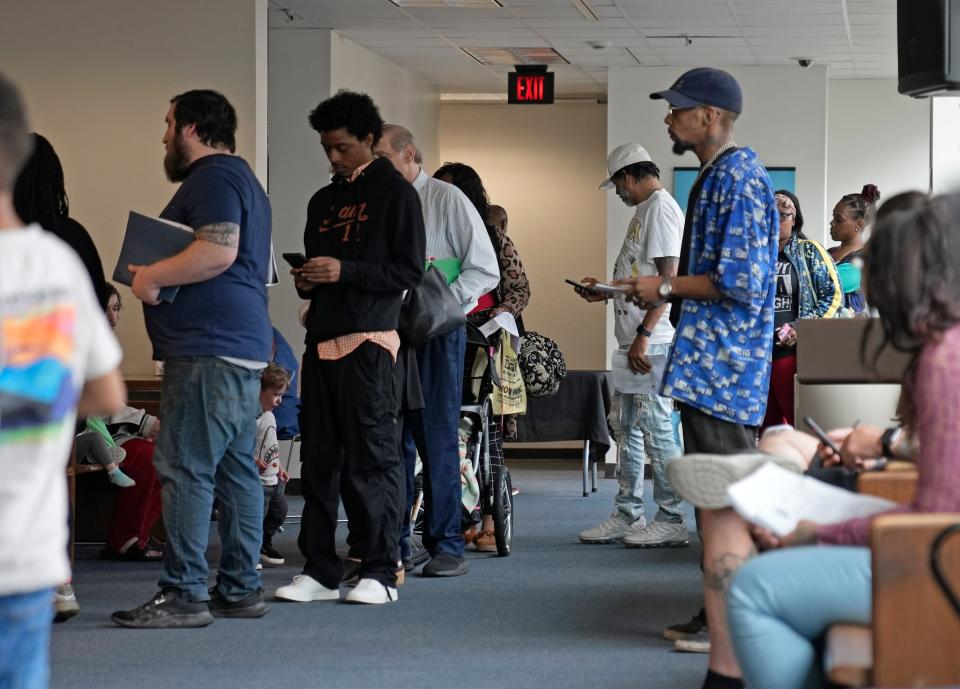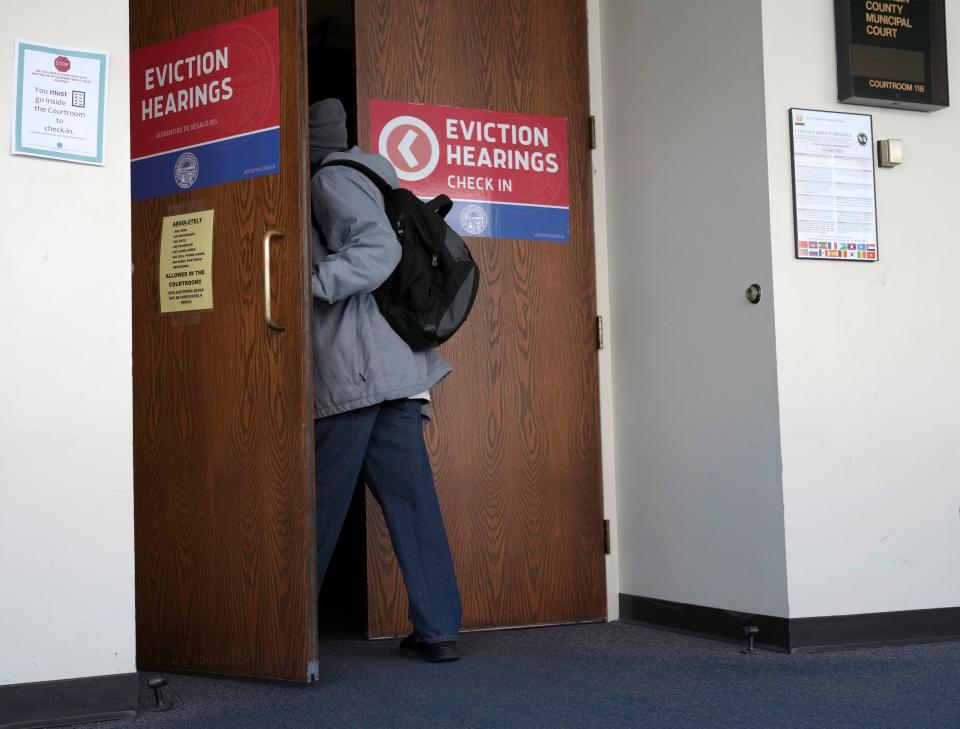COVID rental assistance is running out locally. What it means if you're facing eviction
Several local leaders are sounding the alarm as federal pandemic-related rental assistance funds run dry.
The city and county are heading toward disaster, said Stephanie Hightower, president and CEO of the Columbus Urban League.
Millions of dollars in federal Emergency Rental Assistance (ERA) have flowed into the city and county since 2021, but those funds must be spent by September 2025. But some say the money will run out long before then.
And they worry that there isn’t a plan to help the thousands of people who have depended on them after they’re exhausted.
"There's always been a need," said Shameikia Smith, vice president of housing programs at IMPACT Community Action, of rental assistance. "The need just hasn't been this great."
What is Emergency Rental Assistance Program funding and how much did Columbus get?

The U.S. Department of the Treasury provided local communities with more than $46 billion in hopes of supporting housing stability for renters during the pandemic. The funding came as part of the Consolidated Appropriations Act of 2021 and the American Rescue Plan Act of 2021 and went to more than 10 million payments to renters faced with eviction.
Both Franklin County and Columbus received ERA money from the federal government. The county got $89 million in funding, according to Robin Ross, spokeswoman for the Franklin County Board of Commissioners. IMPACT Community Action, Home for Families and the Columbus Urban League are distributing it to those in need and have helped approximately 15,700 households.
The city got $129 million in rental assistance funding and has about $3 million remaining, according to Kali Harris, the federal grants coordinator for the city's Department of Finance and Management. It has served about 20,400 households with the money, Harris said. Columbus is working with 28 nonprofit partners to distribute the money to residents, Harris said, and the focus has been on those at immediate risk of homelessness or eviction.
Rental assistance money may run out before year's end
Though the city said that it anticipates its funding will last until the September 2025 deadline to use the money, several of the local nonprofit partnering agencies paint a much bleaker picture of how long they can help people in need.
"I am predicting that there's going to be a crisis ... when these dollars run out," Hightower said.

The Columbus Urban League is giving out the last of its funding from the county. The money was expected to last into 2025, but Jeaneen Hooks, vice president of programs at the Urban League, estimates there's only enough money for a few more weeks — into August or September at the latest.
Smith said IMPACT Community Action anticipates its funding will run out by the year's end.
"We're still not at pre-pandemic levels, but the money is running out," she said.
And it won't be renewed.
"The funding in our community is depleted," she added.
Housing creation: Columbus housing authority announces affordable housing coming to Columbus and Reynoldsburg
IMPACT Community Action used its funding to set up outside the eviction court at Franklin County Municipal Court. Only those going through eviction proceedings could access the agency's ERA dollars to pay past due or current rent. The nonprofit agency has already scaled down the number of days it is at eviction court, as the money is running out, Smith said.
Still, people are in need, and she doesn't see that changing. A few weeks ago, 250 people applied for the funding at eviction court in over a week's time.
Rent prices started going up in Greater Columbus even before the COVID-19 pandemic and have been increasing at an even greater rate ever since.
Rent growth surpassed wage growth in 44 of 50 of the largest U.S. metro areas since before the pandemic, according to an analysis by StreetEasy and Zillow. The analysis found that rents grew 40.4% nationally from 2019 to 2023.
A new program may help fill some gaps
Rental assistance was provided locally before the pandemic, but on a much smaller scale, as funding was more limited and the need wasn't as great.
As the funding is set to end or run out soon, local officials and nonprofit groups are trying to figure out how to help the vast number of people they expect will still be in need.
The Columbus Urban League has a plan, Hooks said.
The group recently began a three-year program called the Housing Accelerator Initiative, which is funded by the Key Bank Foundation.
'It keeps people alive': Eviction mediation can save lives. Here's how one Columbus group helps tenants, landlords
The program, which Hooks hopes will grow beyond its current funding of $300,000, helps renters at risk of losing their housing. People remain in the program for about six months and receive financial support, workforce instruction and life coaching, Hooks said.
The program is intended to help people make more money, manage that money better and make more informed life decisions, she said. With its current funding, the program should help 200 to 300 families get stable housing and economic self-sufficiency, she said.
By comparison, the Columbus Urban League has helped more than 3,000 families so far, with the ERA funding giving households an average of $2,500, Hooks said.

The Housing Accelerator was born out of a need to pivot and help renters not just with emergency assistance but in building self-sufficiency, Hooks said, which COVID funding didn't allow. She said the Urban League wasn't allowed to require classes or programming for recipients of ERA funding and saw people come back for help multiple times as a result.
The Urban League is working with partners, including IMPACT Community Action, to help people through the accelerator and potentially prevent the coming crisis, Hook said.
"If we do this right, we create a national model," she said. "I want to help my community, my clients become much more self-sufficient and less reliant on tax dollars."
A community decision on housing
Smith, with IMPACT Community Action, said the nonprofit group doesn't have a plan to backfill the support it's been able to provide after its federal funding runs out.
"As a community, we have to make a decision about increasing available housing units for every group," she said.
The solution has to be more than just programming, Smith said. There have to be real monetary investments to replace the ERA funding going forward.
The assistance programs during the pandemic worked, but they weren't ever meant to cover the costs of recipients' entire lease, she said.
Record-setting and set to worsen: Eviction filings at 20-year high in Columbus, Franklin County and set to worsen. See why
The county offered $17 million of its own money pre-pandemic for housing services, though even that wasn't enough to meet demand, Ross said. This year, the county budgeted $15 million to support affordable housing and homeless services and ended up giving another $2 million to the Community Shelter Board due to critical needs including the rapid rehousing program, homelessness prevention and its winter warming centers.
But local governments will have fewer resources to provide short-term rental assistance as federal dollars run out, Ross said.
The city is trying to find additional money to help supplement the loss of the ERA money, Harris said, and will use its remaining federal COVID rental assistance funding on the most vulnerable residents.
How can people access rental assistance funds?
As the ERA funding ends and IMPACT leaves eviction court later this year, those in need can still reach out to the group for help, Smith said. People can come to their offices at 711 Southwood Ave. or call 614-252-2799.
To apply for the Housing Accelerator Initiative through the Columbus Urban League, call 614-257-6300.
Even if residents don't qualify for the initiative, Hooks said the Urban League will look for other ways to help them out.
Residents can also visit www.rentful614.com for more information on local programs that can offer rental assistance.
dking@dispatch.com
@DanaeKing
This article originally appeared on The Columbus Dispatch: Dwindling emergency rental assistance may spell crisis in Columbus

